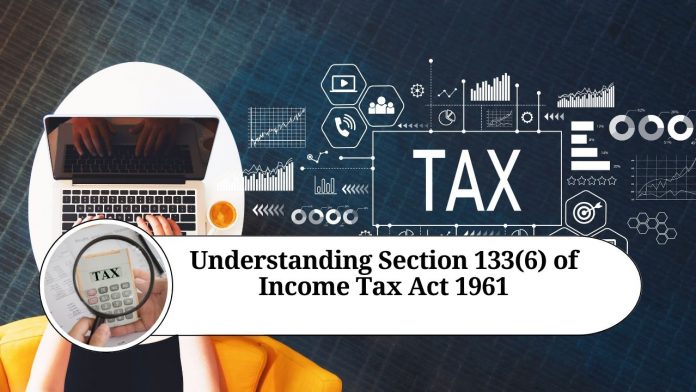Section 133(6) of the Income Tax Act 1961 is an important provision that empowers the tax authorities to gather information from any person who is in possession of books of accounts or other documents relevant to a tax proceeding. This provision serves as a tool for the tax authorities to verify the accuracy of the information provided by the taxpayer and to detect any tax evasion.
What is Section 133(6) of Income Tax Act 1961?
Section 133(6) of the Income Tax Act 1961 gives the power to the income tax authorities to summon any person who is in possession of books of accounts or other documents that are relevant to a tax proceeding. The tax authorities can ask the person to provide the necessary information and documents related to the tax proceeding. This section empowers the tax authorities to carry out an investigation into the tax matter and to verify the accuracy of the information provided by the taxpayer.
Who can be summoned under Section 133(6)?
Section 133(6) of the Income Tax Act 1961 empowers the tax authorities to summon any person who is in possession of books of accounts or other documents relevant to a tax proceeding. This means that the tax authorities can summon not only the taxpayer but also any other person who has the relevant information or documents.
The person who is summoned under this section has a legal obligation to comply with the summons and provide the necessary information and documents. Failure to comply with the summons can result in penalties and other legal consequences.
What kind of information can be obtained under Section 133(6)?
The information that can be obtained under Section 133(6) of the Income Tax Act 1961 can be in the form of books of accounts, bills, vouchers, documents, and any other records that are relevant to the tax proceeding. The tax authorities can use this information to verify the accuracy of the information provided by the taxpayer and to detect any tax evasion.
The information obtained under this section can be used as evidence in the tax proceeding. Therefore, it is important for the person who is summoned to provide accurate and complete information.
Conclusion
Section 133(6) of the Income Tax Act 1961 is an important provision that empowers the tax authorities to gather information from any person who is in possession of books of accounts or other documents relevant to a tax proceeding. This provision helps the tax authorities to verify the accuracy of the information provided by the taxpayer and to detect any tax evasion.
It is important for the person who is summoned under this section to comply with the summons and provide accurate and complete information. Failure to comply with the summons can result in penalties and other legal consequences. Therefore, it is important for taxpayers to maintain accurate and complete records to avoid any legal issues.
Read more useful content:
- section 145 of income tax act
- section 10e of income tax act
- section 9 of the income tax act
- section 94b of income tax act
- section 206aa of income tax act
Frequently Asked Questions (FAQs)
Q. What is Section 133(6) of the Income Tax Act 1961?
Section 133(6) of the Income Tax Act 1961 gives the power to the income tax authorities to summon any person who is in possession of books of accounts or other documents that are relevant to a tax proceeding.
Q. Who can be summoned under Section 133(6)?
The tax authorities can summon any person who is in possession of books of accounts or other documents relevant to a tax proceeding. This means that not only the taxpayer but also any other person who has the relevant information or documents can be summoned.
Q. What kind of information can be obtained under Section 133(6)?
The information that can be obtained under Section 133(6) can be in the form of books of accounts, bills, vouchers, documents, and any other records that are relevant to the tax proceeding.
Q. Is it mandatory to comply with the summons under Section 133(6)?
Yes, it is mandatory for the person who is summoned under Section 133(6) to comply with the summons and provide the necessary information and documents. Failure to comply with the summons can result in penalties and other legal consequences.
Q. Can the information obtained under Section 133(6) be used as evidence in a tax proceeding?
Yes, the information obtained under Section 133(6) can be used as evidence in the tax proceeding.
Q. What happens if the person summoned under Section 133(6) fails to provide the necessary information and documents?
If the person summoned under Section 133(6) fails to comply with the summons and provide the necessary information and documents, penalties and other legal consequences may be imposed.
Q. Can the taxpayer object to the summon under Section 133(6)?
The taxpayer can object to the summon under Section 133(6) if it is not relevant to the tax proceeding or if the summon is issued for an improper purpose. However, the objection must be made within the prescribed time limit and supported by valid reasons.
Q. Can the taxpayer appeal against the summon under Section 133(6)?
The taxpayer can file an appeal against the summon under Section 133(6) to the higher authorities if he/she feels that the summon is not relevant to the tax proceeding or if it is issued for an improper purpose. However, the appeal must be filed within the prescribed time limit and supported by valid reasons.
Q. Is it advisable to maintain accurate and complete records to avoid any legal issues under Section 133(6)?
Yes, it is advisable for taxpayers to maintain accurate and complete records to avoid any legal issues under Section 133(6). This will help the taxpayers to comply with the summons and provide the necessary information and documents in a timely and efficient manner.




















